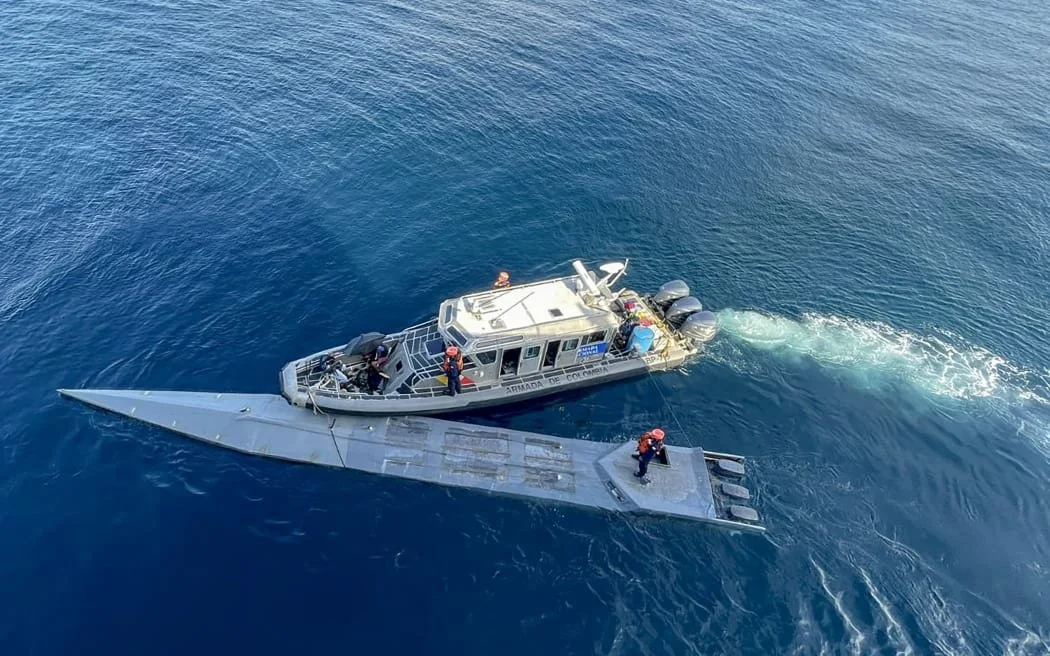Pacific Nations Could Become ‘Narco-States’, NZ Crime Advisor Warns
Pacific Island nations are facing an escalating threat from organised crime and the global drug trade, with a top New Zealand advisor warning that some countries risk turning into “narco-states” if urgent action isn’t taken.
The Pacific region is increasingly used as a transhipment point for illicit goods destined for New Zealand and Australia. Photo: AFP Photo / Colombian National Navy
Steve Symon, chair of New Zealand’s Ministerial Advisory Group on Transnational and Serious Organised Crime, said the Pacific’s growing use as a drug trafficking route to New Zealand and Australia has brought serious consequences for local communities.
“What’s happened is that in trying to reach New Zealand and Australia, we’ve opened up drug routes through the Pacific, which has seen a rise in the methamphetamine use in places such as Fiji and Tonga,” Symon said.
“If we continue with business as usual, we will continue to go backwards. Places like Fiji, Tonga, Samoa, and Rarotonga are vulnerable because of their size and economic difficulties. Those countries are at risk of becoming narco-states.”
He warned that once organised crime infiltrates public institutions, including police, customs, and border agencies, it can corrupt entire systems of governance.
Steve Symon said a nation becoming a narco-state would mean organised crime corrupting government organisations.
Growing Threat Across the Pacific
In a new report titled “Lead Boldly, Act Decisively: Tackling and Dismantling Organised Crime”, the advisory group said organised crime poses one of the most serious threats to New Zealand and the region.
“The Pacific region is increasingly used as a transhipment point for illicit goods destined for New Zealand,” the report noted.
Symon said New Zealand had a moral obligation to support Pacific nations in fighting back.
“Our borders really reach into the Pacific. The drugs that are coming to New Zealand and Australia are passing through there. We need to reach out and stop things coming through the Pacific,” he said.
He urged stronger regional coordination to help local law enforcement “fight as one.”
‘No Excuse’ for Inaction
José Sousa-Santos, head of the Pacific Regional Security Hub at the University of Canterbury, said both New Zealand and Australia needed to take greater responsibility for the regional drug crisis.
“The Pacific would not have this drug problem if it wasn’t for New Zealand’s and Australia’s hunger for illicit drugs,” he said.
He criticised both countries for deporting criminals back to the Pacific, saying many arrive with no job prospects and often reoffend.
“If a country like New Zealand, with all its resources, struggles to manage deportees, imagine the impact on small island nations,” he said.
The Fentanyl Warning
The report also highlighted an emerging threat from fentanyl, a powerful synthetic opioid that has caused tens of thousands of deaths in the United States.
Between October 2023 and September 2024, around 87,000 opioid-related deaths were recorded in the US, and experts believe the Pacific could be next.
Sousa-Santos said traces of fentanyl have already been found in wastewater tests in Fiji and the Solomon Islands, calling it a “new scourge” that could devastate Pacific communities.
“Most experts looking at the Pacific see fentanyl as the next wave coming to the region,” he said. “Methamphetamine affects mental health, but fentanyl kills — and that’s about as clear as one can make it.”
Symon agreed, saying the social and emotional toll of fentanyl spreading to the Pacific or New Zealand would be catastrophic.
“We had concerns about COVID, but fentanyl is 100 times worse,” he said.
‘The Genie Is Not Out of the Bottle’
While the outlook is grim, Sousa-Santos said it’s not too late to prevent the Pacific from becoming a drug-dominated region.
“The genie is definitely not out of the bottle,” he said. “The red flags are well and truly waving.”
He believes Pacific nations’ traditional community structures, such as churches and chiefly systems, could be key to resisting organised crime — if responses are Pacific-led and partner-supported.


